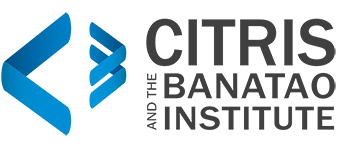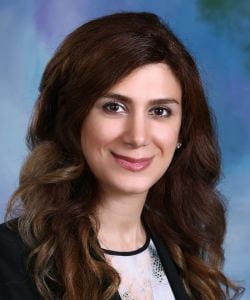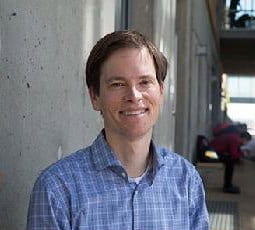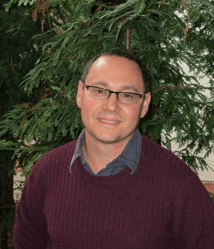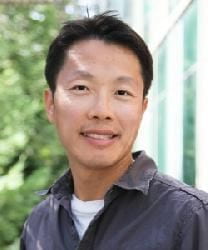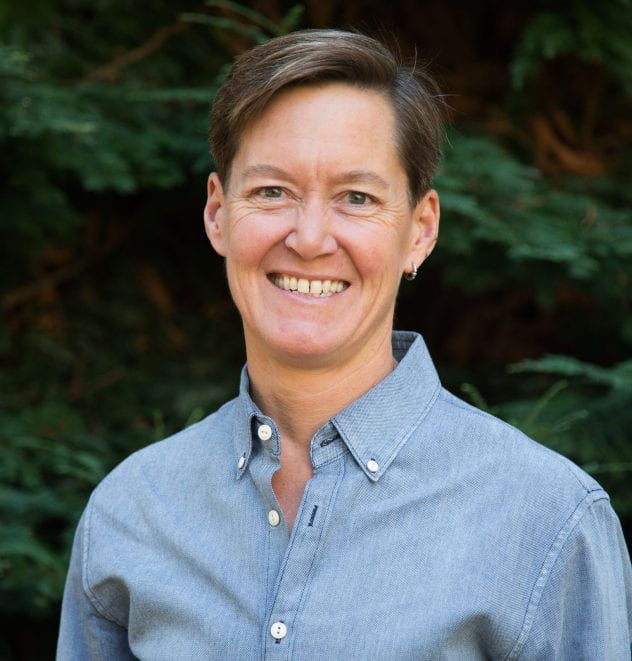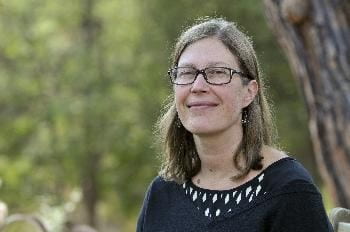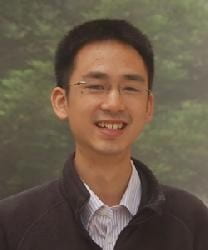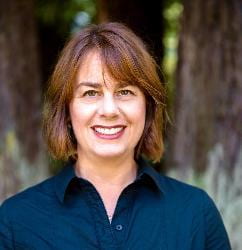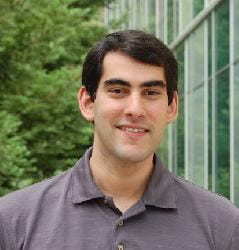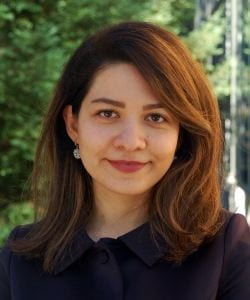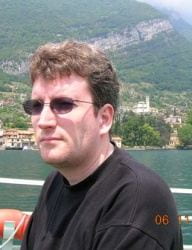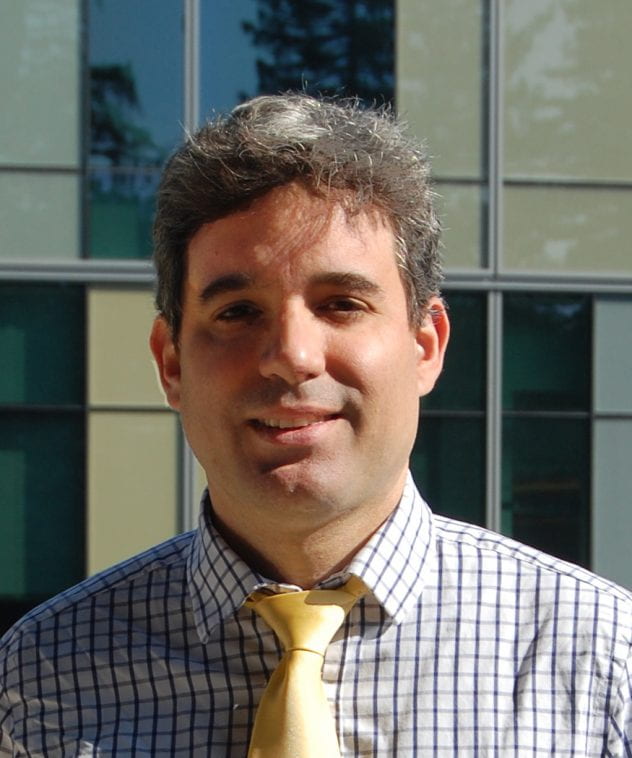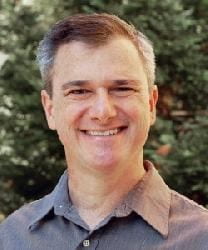SHIVA ABBASZADEHA
Shiva Abbaszadeh’s research focuses on developing new instrumentation, computational approaches, and measurement techniques for radiation detection, sensors, and biomedical imaging. Her overall goal is to further our understanding of disease mechanisms and visualize and detect cancer at the molecular level. Her current projects aim to advance the sensitivity and spatial and temporal resolutions of radiation emission (optical, gamma rays, positrons) to achieve high-quantitative accuracy and image quality of molecular probes in vivo.
ELLIOT CAMPBELL
Dr. Elliott Campbell is an Associate Professor and the Stephen R. Gliessman Presidential Chair in Water Resources and Food System Sustainability in the Environmental Studies Department at UC Santa Cruz. Dr. Campbell’s research emphasizes the use of regional and global models to extrapolate from small-scale field measurements to policy-relevant spatial scales, particularly within the context of agroecology and global biogeochemical cycles. This work has led to his CAREER award from the National Science Foundation, appearances in media ranging from NPR to The Economist, and consultations to the U.S. EPA and other government agencies. He serves on the Associate Editorial Board at Frontiers in Ecology and the Environment and the faculty advisory committee at the University of California President’s Postdoctoral Fellowship Program.
MANEL CAMPS
The laboratory of Professor Manel Camps studies the biological consequences of random changes in genetic information (mutations). The main approaches include directed evolution, i.e. the generation of random mutant libraries coupled with specific selections or screens for new biological activities and also a variety of bioinformatics and statistical approaches for the study of mutational signatures (as indicators of distinct sources of mutations) and for the identification and quantification of patterns of co-occurrence or mutual exclusion between mutations or genes undergoing specific selective pressures (as indicators of functional overlap).
YIHSU CHEN
Yihsu Chen is a Professor in Technology Management in Sustainability, Electrical, and Computer Engineering at the University of California Santa Cruz. Prior to joining UCSC, he held a faculty position at University of California Merced with a joint appointment with School of Engineering and School of Social Sciences, Humanities and Arts. He is also affiliated with UCE3 (University of California Center for Energy and Environmental Economics). Professor Chen’s main research focuses on studying the impact of public policies on energy, water resources and transportation sectors. His research takes interdisciplinary approaches: quantitative models built upon economic principles and solved with operations research techniques. His work has received a number of INFORMS ENRE awards: 2004 best student paper (first place), 2013 and 2014 best publication in sustainability in second place and first place, respectively. Professor Chen’s work typically is policy relevant. In particular, his work on emission trading policies has received considerable attention and also directly contributed to policy debates. For example, his early work with Energy Research Centre of the Netherlands (ECN) on the European ETS (Emission Trading Scheme) windfall profits led to the European Commission auction off emission allowances in the second phase of the ETS. The work has received 700 Google citations. His work on the equivalence of emission trading programs with different point-of-regulation also partly helped the California Air Resources Board finalize their decisions in implementing first-sellers approach to control greenhouse gas emissions associated with imported power. His other work includes life-cycle analysis of biofuel production and the air pollution impact of the public transit system, evaluation of ecosystem services, etc. Professor Chen is also an associate editor of IEEE Transactions on Power Systems (2013 –2019) and ASCE Journal of Energy Engineering (2013 — present) as well as on the international advisory board of Energy Policy (2017–present). He has co-edited a few special issues in Journal of Energy Engineering (2010), IEEE Transactions on Power System. He served as the newsletter editor of INFORMS ENRE during 2010-2013. Full publication can be found at https://orcid.org/0000-0002-9990-8232
ALAN CHRISTY
Dr. Alan Christy is an Associate Professor of History at the University of California, Santa Cruz. His publications include Ethnographies of the Self: Japanese Native Ethnology, 1910-1945 (forthcoming), a translation of Amino Yoshihiko’s Rethinking Japanese History (forthcoming) and essays on modern Okinawan history and war memory in Japan. He teaches courses on Japanese and East Asian history, Okinawa, historiography and memory. Christy holds a Ph.D from the University of Chicago.
JODY GREENE
Jody Greene is Associate Vice Provost for Teaching and Learning and Professor of Literature at the University of California, Santa Cruz. In 2016, she became the Founding Director of UCSC’s Center for Innovations in Teaching and Learning, which provides support, resources, and research-based professional development programming to all who teach at UCSC. In addition to educational and organizational development in Higher Education, Greene’s research interests include intellectual property, human rights, and the history of the institution of literature. Her most recent research concerns corporate personhood, and has resulted in a recently completed co-edited volume on that topic, The Hostile Takeover: Human Rights after Corporate Personhood (with Sharif Youssef; forthcoming from the University of Toronto Press). Greene has published, authored, and edited a number of other volumes, as well as articles in PMLA, Critical Inquiry, Eighteenth-Century Studies, and other journals. She has twice received the UCSC Academic Senate Committee on Teaching Excellence in Teaching Award, as well as the John Dizikes Teaching Award, which annually recognizes an outstanding educator in UCSC’s Humanities Division.
ABHISHEK HALDER
Dr. Abhishek Halder is an Assistant Professor in the Department of Applied Mathematics at UCSC. His research areas are control theory, machine learning, and optimization with application focus on large scale cyber-physical systems such as smart grid and unmanned aerial vehicle traffic management. He obtained his Ph.D. from Texas A&M University, and Bachelor’s and Master’s Degrees from Indian Institute of Technology (IIT) Kharagpur, in Aerospace Engineering. At UCSC, he teaches courses on Convex Optimization, Applied Optimal Control, and Nonlinear Control Theory.
KATHERINE ISBISTER
Katherine Isbister is a Human Computer Interaction and Games Researcher who creates and studies digital games and other playful computer-supported experiences. Her focus is on emotion and social connection–understanding the impact of design choices on these qualities, and getting better at building and evaluating technology that supports and enhances social and emotional experience. The work in her lab has been cited in Wired, Scientific American, and NPR, among other venues. Katherine is currently a full professor in the Department of Computational Media at the University of California, Santa Cruz, where she directs the Center for Computational Experience. Until June 2015, she was an Associate Professor jointly appointed between the Computer Science Department at New York University’s School of Engineering in Brooklyn, and the NYU Game Center. Katherine was also the founding Research Director of the Game Innovation Lab at NYU’s School of Engineering. After completing a Ph.D. at Stanford University, where she studied Communication as well as Human-Computer Interaction, she worked in research labs in Japan, Sweden, Denmark, and the U.S., and in software start-ups and design consultancies (past clients include Microsoft, Paramount, BMW, Electronic Arts, Ubisoft, and others). Along the way, Katherine has written several books: Better Game Characters by Design, Game Usability, and most recently, How Games Move Us. In 1999, she was selected as one of MIT Technology Review’s TR100 Young Innovators most likely to shape the future of technology, and have been busy ever since
DAVID LEE
David T. Lee is an Assistant Professor of Computational Media at UC Santa Cruz. He received his PhD from Stanford University, where he was a part of the Society and Algorithms Lab and Crowdsourced Democracy Team. He received his B.S. from the California Institute of Technology. His research integrates design, algorithms, and incentives to support experiential learning at scale and supports governments and nonprofits in motivating community members to address complex, societal issues. His work has received a paper award at AAAI HCOMP and ACM CHI, been published in the Proceedings of the National Academy of Sciences (PNAS), and was deployed with the Finland Ministry of the Environment. He is a recipient of the NSF Graduate Research Fellowship, an Accel Innovation Scholar, a two-time recipient of a Magic Grant from the Brown Institute for Media Innovation, and a recipient of the Baskin School of Engineering Teaching Excellence Award.
REBECCA LONDON
Rebecca London is an Assistant Professor of Sociology at the University of California, Santa Cruz. Her research focuses on understanding the challenges faced by disadvantaged children and youth and the ways that communities and community organizations support young people to be healthy and successful. Using both qualitative and quantitative methods, she has conducted research in multiple fields, including: K-12 and post-secondary education, health and wellness, after-school programs, welfare reform, the digital divide and children’s living arrangements. Her research has been published in numerous journals, edited volumes, and policy briefs as well as presented at professional conferences, in community forums and in legislative testimony.
DARRELL LONG
Dr. Darrell D. E. Long is Distinguished Professor of Engineering at the University of California, Santa Cruz. He holds the Kumar Malavalli Endowed Chair of Storage Systems Research and is Director of the Storage Systems Research Center. He has authored highly cited research papers on web caching, distributed file systems, power-aware hard disk management in mobile computing, and low-bandwidth multicast techniques for video on demand, among other topics. Dr. Long received his B.S. Degree in Computer Science from San Diego State University, and his M.S. and Ph.D. from the University of California, San Diego. In 2006, he was elevated to Fellow of the Institute of Electrical and Electronics Engineers (IEEE) “for contributions to storage systems architecture and performance.” In 2008, he was inducted a Fellow of the American Association for the Advancement of Science (AAAS). He is a member of the IEEE Computer Society, the Association for Computing Machinery, the American Society for Engineering Education, the Usenix Association, Upsilon Pi Epsilon and Sigma Xi.
EDWARD MELCER
Dr. Edward Melcer is an independent game developer, Director of the Alternative Learning Technologies and Games (ALT Games) Lab, and Assistant Professor in the Department of Computational Media at UC Santa Cruz. His primary teaching and research interests are at the intersection of games, human-computer interaction, and learning science, where he explores the usage of novel interfaces, emerging technologies, and embodiment to enhance learning outcomes in educational games. His educational games have won awards in venues such as the “Serious Games Showcase & Challenge” and “Games for Learning Design Competition,” and his independent games have been featured in a number of premiere venues such as IndieCade, IndieCade East, and Come Out & Play.
NARGES NOROUZI
Narges Norouzi received her Ph.D. and M.A.Sc. in The Edward S. Rogers Sr. Department of Electrical & Computer Engineering in 2017 and 2014, respectively, from the University of Toronto, Canada. She also received her B.A.Sc. from Sharif University of Technology in 2012. She is currently a Teaching Professor in the Computer Science & Engineering Department of Baskin School of Engineering at the University of California, Santa Cruz. Her research interests include Computational Biology, Biometric Systems, Machine Learning, Statistical Signal Processing with applications in Image Processing, Pattern Recognition, and Adaptive Systems.
SCOTT OLIVER
Scott Oliver is a Professor in the Physical & Biological Sciences Division at UC Santa Cruz. The Oliver Research Group has a broad range of research interests in materials and chemistry. They have developed a series of materials that bear a cationic charge. The open space inside these hosts contain anions that can be exchanged for environmentally hazardous anions, both heavy metal inorganic and organic. The Oliver Research Group is studying a variety of anionic pollutants including perchlorate, nitrate, pertechnetate, arsenate and chromate. The group’s studies are interdisciplinary and include a combination of inorganic, materials, environmental and analytical chemistry. Other efforts include energy releasing materials, energy storage materials and polymer recycling.
WARREN SACK
ABEL RODRIGUEZ
I am a Professor of Statistics at the Baskin School of Engineering at the University of California, Santa Cruz. I am also the Associate Director of the Center for Data, Discovery, and Decisions (D3) at UC Santa Cruz, and served as Associate Dean for Graduate Affairs in the School until September 2019. I develop statistical methods for complex problems in biology, social sciences, and engineering. My research interests include Bayesian statistics and machine learning, especially nonparametric methods, spatial temporal models, network analysis and extreme value theory.
HOLGER SCHMIDT

Professor Schmidt is the Narinder Singh Kapany Chair of Optoelectronics and the Associate Dean for Research for the School of Engineering at UC Santa Cruz. He is Professor of Electrical and Computer Engineering and directs the Applied Optics Research Group (http://photon.soe.ucsc.edu) and the W.M. Keck Nanofabriaction Facility. He has authored or coauthored over 380 publications and several book chapters in various fields of optics. He is co-editor of the CRC Press’ Handbook of Optofluidics. Dr. Schmidt is a member the American Physical Society, the Materials Research Society, and Senior Member of the IEEE. He is a member of the California Institute for Quantitative Biomedical Research (QB3), the Center for Biomolecular Science and Engineering (CBSE), and the Storage Systems Research Center (SSRC). He directs the W.M. Keck Center for Nanoscale Optofluidics at UC Santa Cruz. He was elected Fellow of the Optical Society of America in 2014 and Fellow of the IEEE in 2017. He received the Engineering Achievement Award from the IEEE Photonics Society for development of optofluidic waveguide technology in 2019.
MICHAEL WEHNER
Michael Wehner is the founder of the UCSC Machine Interaction Lab, which leverages expertise in machine design, soft systems, and human factors to develop novel solutions in the fields of robotics, soft robotics, and embodied intelligence. His soft robotics work includes development of Octobot, the world’s first entirely soft robot, investigations into energetics/fuel options for mobile soft robots, soft lithography/microfluidics in robotics, liquid ionic sensors for proprioceptive feedback, and development of early crawling and jumping soft robots. Exploration of these soft systems has provided a foundation for exploration of embodied intelligence, the interaction between body and mind, and body-wide distributed computation. Wehner has also worked extensively in industry, including consulting for companies which create medical devices, consumer products, and semiconductor capital equipment.
JIN ZHANG
Jin Zhang is a professor in the Department of Chemistry and Biochemistry at UC Santa Cruz. His research focuses on design, development, characterization, and application of advanced materials with emphasis on optical and electronic nanomaterials (nanocrystals or quantum dots) of both semiconductors and metals. Some of his ongoing projects include research on Surface-enhanced Raman scattering (SERS), Ultrafast interfacial electron dynamics and surface modification of semiconductor nanoparticles, and Solar energy conversion. Zhang has a PhD from the University of Washington, Seattle and was a Postdoctoral Fellow at UC Berkeley. Some of his recent awards and recognitions include the Richard A. Glenn Award from the ENFL Division of ACS, Elected Fellow of the American Chemical Society, and Elected Fellow of the American Association for the Advancement of Science (AAAS.)
